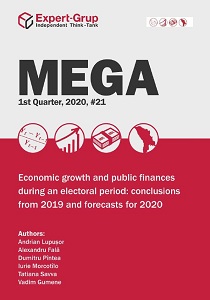MEGA - Moldova Economic Growth Analysis № 21 / 2020
MEGA - Moldova Economic Growth Analysis № 21 / 2020
Author(s): Adrian Lupuşor, Alexandru Fală, Dumitru Pîntea, Iurie Morcotîlo, Tatiana Savva, Vadim Gumene
Subject(s): National Economy, Economic policy
Published by: EXPERT-GRUP Centrul Analitic Independent
Summary/Abstract: After a relatively favorable economic year, 2020 brings more macroeconomic challenges, with major risks for the public finance system. Overall, the economic growth in 2020 will be tempered compared to the result recorded in 2019. Thus, after the economy grew by about 4.5-5% in 2019, in 2020 the GDP will advance by about 3.5-4%. Most economic sectors will show relatively slow growth rates in 2020. The most significant slowdown compared to 2019 will be registered in the construction sector. The sector that was the leader of growth in 2019, with an increase in value added close to 20%, in 2020 will advance by only 2%. On the other hand, domestic trade will remain on a positive track and will ensure the largest contribution to GDP growth in 2020. A first cause of this anticipated economic slowdown for 2020 is the complete dissipation of the effects of the fiscal reform implemented in the last quarter of 2018 (reduction of the social security contribution rate paid employers). Although the relaxation of the monetary policy and the increase of consumption will stimulate the dynamics of private investments, they will no longer benefit from the impulse generated by the mentioned tax reform. Also, the slowing of the economic advance in the EU (the main trading partner of the Republic of Moldova) will lead to the moderation of the rhythms of growth of Moldovan exports, with negative repercussions on economic growth. The expansionary budgetary policy will stimulate the expansion of domestic demand, by increasing public investments and budgetary wages, but this will be mainly covered by imports, further aggravating the current account deficit problem. At the same time, the mechanism of financing the budget deficit could have negative implications on the economic growth if the Government will actively resort to loans from banks, which will undermine the lending of the real sector (crowding out effect).
Series: MEGA - Moldova Economic Growth Analysis
- Page Count: 59
- Publication Year: 2020
- Language: English
- Content File-PDF
- Introduction

